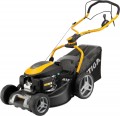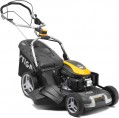Cutting width
The capture width provided by the unit, in other words, the width of the strip of land cultivated in one pass. In fact, this size corresponds to the width of the working nozzle.
The large working width is useful when processing large open spaces, as it allows you to finish the job in a small number of passes. On the other hand, for hard-to-reach places, relatively narrow tools are better suited, able to go where a wider unit will not fit. In addition, the width of the tool directly affects the weight and price.
In general, it makes sense to compare in terms of working width only units of the same type (see above). However, it is worth noting here that trimmers do not differ so much from each other — most models capture from 25 to 45 cm (and a wide processing band is provided by moving the nozzle from side to side). As for the other types, in the most modest models the capture width
does not exceed 40 cm, in the heaviest and most powerful it can be
56 – 60 cm or even
more(in mini tractors — up to 1.5 m).
Min. cutting height
The minimum cutting height provided by the lawnmower — that is, the smallest height of grass that can remain after the passage of the machine. It makes sense to pay attention to this indicator mainly in cases where the lawn is planned to be cut as short as possible. In addition, the lower the minimum height (with the same maximum), the wider the height adjustment range of this model.
Number of height settings
The number of cutting height settings provided by the lawn mower. The more such settings (with the same adjustment range) — the more accurately you can choose the mowing height. Note that in some robots (see "Type") this number reaches 30 or more with a range of 30 to 60 mm; in other words, you can select the height to the nearest millimetre.
Recommended area
The area of the site for which the lawn mower is designed. It cannot be argued that this parameter is critical when choosing a device, these are only manufacturer's recommendations and are very conditional. However, they are more than justified and generally show the available front of work based on the heating of the motor, the capacity of the tank or battery, and other factors that affect the duration of work.
Bag volume
The volume of the grass clipping bag supplied with the lawn mower. Manufacturers select this volume depending on the power, performance and overall level of the unit, however, similar models may differ in this indicator. In such cases, it is worth considering that a larger bag takes longer to fill and needs to be unloaded less often, but it weighs more and takes up more space (even when empty). Mostly the difference in the volume of the bag is 5 liters and there are
lawn mowers for 35,
40,
45,
50, 55,
60,
65,
70 and more liters.
Features
-
Self-propelled. In self-propelled lawn mowers, the engine rotates not only the cutting tool, but also the wheels of the lawn mower; thus, the user does not need to push it in front of him - it is enough just to set and control the direction of movement. This is convenient, but such models are more expensive than non-self-propelled ones. This is due not only to the complexity of the design, but also to the fact that such devices require more powerful engines - after all, power must be divided between the cutting nozzle and the chassis. For the same reason, a self-propelled unit will be less productive and efficient than a non-self-propelled analogue of the same power. However, some types of lawn mowers are by definition self-propelled - in particular, these are heavy professional models that would be difficult to push with your hands, as well as
mini tractor riders(see "Type").
-
Height adjustable handle. Possibility of height adjustment of the lawn mower handle, which allows to optimally adjust the device to the height of the user. This feature is especially useful for short or, conversely, tall people - by default, lawn mower handles are made for medium height, and it would be inconvenient to work with the unit without height adjustment.
-
Piano wheels. The lawn mower has special, so-called. caster wheels (similar to th
...ose used, for example, in supermarket carts). These wheels automatically turn in the direction of movement of the device, which significantly reduces the turning radius of the lawn mower and increases its maneuverability. At the same time, it is worth noting that this design is usually used only for the front wheels, while the rear ones remain rigidly fixed to the axle. So moving such a structure sideways still does not work.
- Flushing fitting. The presence of a fitting in the lawn mower for connecting a garden hose; usually such a fitting is located on the deck and is designed for a standard connector used in hoses. In accordance with the name, this function allows you to rinse the deck and blade of the unit, removing grass residues and other contaminants from them: just connect the hose, turn on the working nozzle and give water. This is much more convenient than removing the deck and washer blade by hand - especially when it comes to a heavy professional mower or rider (see "Type").
- Cup holder. The presence of a cup holder in the design of the lawn mower - a specialized stand for glasses and relatively small bottles. Such a stand usually has a characteristic recess where a container with a drink for the operator is installed. Often, cupholders are made in pairs, they are placed on a separate panel between the tubes of the handle of the unit. There are coasters in traditional lawn mowers and riders (mini tractors).Motor model
Model of the engine installed in the lawn mower. The main performance data of the engine is usually indicated in the general data for the unit. However, knowing the exact name of the motor, you can find more detailed information on it — from specific data to reviews and reviews. Also, data on the engine model can be useful when searching for spare parts or consumables.
Motor power
Lawnmower engine power expressed in horsepower. The common unit of power these days is the watt, but gasoline and diesel engines (see "Engine Type") are traditionally referred to as hp. Some units are easy to convert to others: 1 hp. approximately equal to 735 watts.
In general, the more powerful the engine, the more performant the mower is and the better it handles with heavy work such as cutting thick grass, bushes, etc. On the other hand, high power has a corresponding effect on fuel consumption, as well as the weight and price of the engine. In addition, it should be taken into account that different types of mowers (see "Type") differ in terms of power requirements. For example, among trimmers there are many models with a capacity of
0.7 – 1.3 hp., for gasoline lawn mowers, the minimum power is already in the range of
1.3 – 2 hp., and for
mowers,
at least 2.5 hp is required. . So you can only compare units of the same type in terms of power. Detailed recommendations for choosing a mower depending on its type and features of the planned work can be found in special sources.
Motor power
Lawnmower engine power expressed in watts. This designation is used absolutely for all electric models (see "Engine type"), and it is also often found in gasoline and diesel units along with horsepower (these units are clearly related, 1 hp is about 735 watts).
In general, the more powerful the engine, the more performant the mower and the better it will cope with heavy work such as cutting thick grass, bushes, etc. On the other hand, high power has a corresponding effect on fuel / electricity consumption, as well as the weight and price of the engine. In addition, note that the power requirements depend on the type of mower itself and its engine (see above for both). For example, for most
robots, the power
does not exceed 500 W — more, taking into account specialization, is not required, besides, otherwise the devices would turn out to be too bulky and heavy. Trimmers and lawn mowers of similar power are only electric, and the power limit for power tools is
2500 – 3000 W when powered from the mains and
1500 – 2000 W for battery models. But in gasoline tools, the minimum power is about
500 – 1000 W for trimmers and
1000 – 1500 W for mowers; the maximum value can exceed
4 kW.
Detailed recommendations for choosing a lawn mower d
...epending on its type and features of the planned work can be found in special sources.
